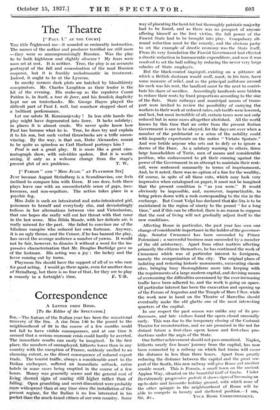The Theatre
[" PAUL I." AT THE COURT]
THE title frightened me—it sounded so eminently instructive. The names of the author and producer terrified me still more —they were so uncompromisingly Russian. Was the play to be both highbrow and slightly obscure ? My fears were soon set at rest. It is neither. True, the play is an accurate portrayal of the fall and assassination of the mad Russian emperor, but it is frankly melodramatic in treatment. Indeed, it ought to be at the Lyceum.
In murky corners dark plots are hatched by bloodthirsty conspirators. Mr. Charles Laughton as their leader is the kit of the evening. His make-up as the repulsive Count Pahlen is, in itself, a tour de force, and his fiendish duplicity kept me on tenterhooks. Mr. George Hayes played the difficult part of Paul I. well, but somehow stopped short of a brilliant performance.
Let me salute M. Komisarjevsky 1 In less able hands the play might have degenerated into farce. It lacks subtlety; in places it is almost crude. We never quite know how Paul has become what he is. True, he does try and explain it to his son, but such verbal throwbacks are a trifle uncon- vincing. By the way, is that son, Duke Alexander, meant to be quite as spineless as Carl Harbord portrays him ?
Paul is not a great play. It is more like a great eine- tnatograph show, with sub-titles spoken. But it is worth seeing, if only 'as a welcome change from the stage's
present glut of sex problems. T. W.


















































 Previous page
Previous page